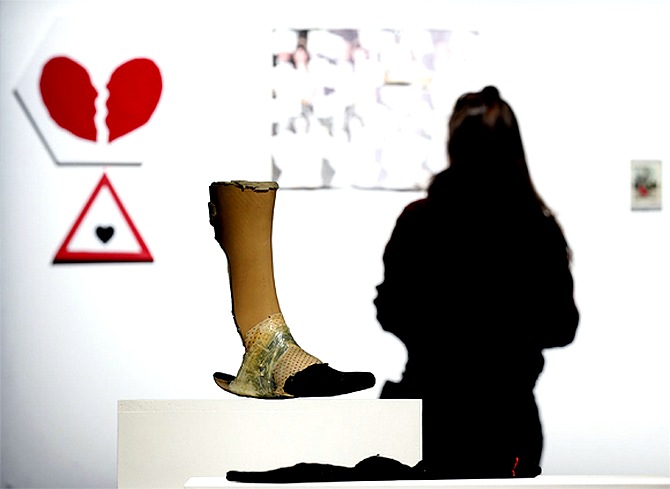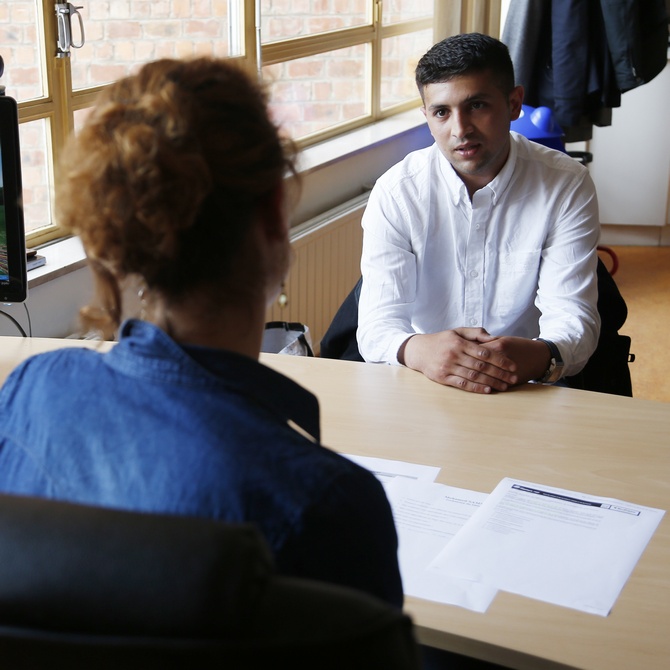Photographs: Oleg Popov/Reuters Shameem Akhtar
How can you be Happy? Shameem Akhtar's 10 easy ways to discover that elusive thing called Happiness.
Agony aunts make a living out of telling you what you already know -- that letting go is the key to all problems.
For women, nurtured and trained through generations to endure and get by, this may be the most difficult thing to do.
Not letting go may be due to various things -- the belief that somehow it is a gesture of unconditional love and so however deep the pain may be, one must hold on.
Often it may be simply that the thing to let go could be something or someone still very much in the 'neighbourhood' and the physical proximity makes the attempt appear futile.
Or we have been trained to think that holding on to the thing is very essential and to 'appear' to be happy, and maintaining appearances becomes the raison d'etre rather than independent thinking and withdrawal from the source of pain.
It may be simply that letting go is as painful as hanging on, and one feels one might as well endure the latter.
Shameem Akthar is a yogacharya trained with the Sivananda Yoga Vedanta Centre.
Please ...
1. The past
Image: We often tend to remember the unpleasant things in a relationship rather than the pleasant ones. Seen here is a picture of the Museum of Broken Relationships installed at the CentQuatre exhibition hall in Paris that documents the 'leftovers' of relationships that failed to work.Photographs: Benoit Tessier/Reuters Shameem Akhtar
In most relationships -- sweet or otherwise -- we remember the nasty things done to us rather than the pleasant ones.
We may remember the latter too, but the intensity of memory is reserved for the bad ones.
Notice that when you discuss other people with friends, the bad ones crop up more often.
This is because biologically it makes more sense for us to remember the bad things, to protect us from a hostile environment.
It is part of the evolutionary protective mechanism.
However, part of this mechanism also means that we release stress hormones, adrenaline, and cortisol when we recall these things.
Not to mention the rest of the toxic cocktail of neuro-chemicals that flush through our blood as the trigger of such memories.
So, though we are biologically wired to remember the bad stuff, if we are smart enough and can muzzle the negative recall of past hurts, we would be happy and lighter for it.
Of course, we do need to let off steam.
But once that stage has passed, we should also learn to jettison and fly high.
Not just your mind, but your whole body will be better for it.
Please ...
2. The one 'bad' habit
Image: That extra cup of coffee may be seemingly harmless. But if you feel bad every time you have it, it might be a good idea to give it up.Photographs: Mario Tama/Getty Images Shameem Akhtar
We all have our secret 'bad" habits.
It may not necessarily be 'bad', but it is something that we internally feel is not quite okay.
To indulge in it sets off a critical voice inside.
It could be the extra cup of coffee, the tea addiction, the sweet fixation, the heavy dinner -- ostensibly harmless, but we feel bad every time we do it, which is daily and often.
To pin it down and drop it, to move on, would give a high that will keep us uplifted and upbeat.
Please ...
3. That 'negative' friend
Image: Let go of that unhappy friend who always puts you down.Photographs: Reuters Shameem Akhtar
We all have friends who we love to hate.
The person you invite to every intimate party, but who also leaves you fuming when s/he leaves it.
The person could be a sponger, or makes the sort of compliments that sound suspiciously like a putdown.
Or wants the limelight just when it turns on you, or borrows your things and never returns them; who eyes your boyfriend or who backstabs you when you least expect it.
It is a peculiar thing, but we all have such friends perhaps because we are more generous and forgiving and feel that we can see some gold behind all that grime.
If you continue to be outraged or irritated with this person, or if the person is gnawing at your self-esteem, offloading this friend is the best thing you can do for yourself.
Please ...
4. A draining relationship
Image: A bad relationship can drain you out. Learn to disconnect from such a relationship.Photographs: Reuters Shameem Akhtar
We cannot dump all our relationships at will.
But we can disconnect from them at a very subtle, but deeply emotional level.
This could be any relationship that we are hanging on to just for form -- within a family, dependent siblings, nagging parents or in-laws, the overweening boss.
The idea of changing oneself to help the relationship, or hope for that person to change often keeps us hanging on to the relationship.
Experts in alternative therapies call such relationships psychic vampire behaviour.
Indulging such people often gives them an even greater sense of entitlement. Withdraw from such people at a very intuitive and emotional level, which is called 'cutting the cord" behaviour.
Maintain the relationship but begin to appreciate just how it is harming you.
That sort of awareness will allow you to let go of the relationship at an inner level.
Often, the other party senses your inner withdrawal and may display a reluctant respect for your turnaround.
This could be very liberating and even help the relationship in the long run.
Please ...
5. Jealousy
Image: The notions of comparison and competition are deeply imbibed in our psyche right from childhood.Photographs: Damir Sagolj/Reuters Shameem Akhtar
Since childhood we are familiar with the idea of competing and using jealousy as a complementary tool to help us beat others.
Though this may work in certain spheres of life, it is totally obsolete in other parts of our life.
But our conditioning is so intense that we don't know intuitively where we can use envy (and not jealousy) to work for us, and where it can really hamper our happiness.
Jealousy about what the other possesses -- super holidays, bank accounts, job profile, extroversion or other personality traits that we lack - does not boil down to ambition.
Rather, it implies a serious lack of self-esteem and continuous state of dissatisfaction with who we are.
How can we be happy when this festers like some pus in an untreated wound?
If the other person's achievements act as milestones that we want to achieve, then great.
But they cannot be the yardstick against which we measure ourselves, or else we will always fall short of our own expectations and go through life feeling frustrated and dismal.
Jealousy is an emotion you catch as it sprouts, look it in the eye, and deal with it as irrelevant by listing things that make you happy under the circumstances.
Jealousy can be one of the most difficult emotions to let go because it comes with the pretence of pushing us beyond our comfort zone.
You need a lot of wisdom to deal with it.
Please ...
6. Negative loop of thinking
Image: Break out of the vicious circle of negative thoughts. Photograph used here for representational purposes only.Photographs: Daniel LeClair Shameem Akhtar
Most people are barely aware of it, but that is because thoughts are said to 'move' at the rate of 1.5 miles per second (the speed at which an electric spark leaps between neurons/brain cells).
Before you know it, you have already been knocked out by your own thinking!
Psychologists say that the illusion of 'I' is created around several inner voices running through the mind. A broad range would be the Parent-Adult-Child voice.
In any situation, depending on our conditioning, we are assaulted at once by all the voices playing themselves out: the child trying to do a task, but already anticipating the critical voice of its inner parent.
Often, depending on how we were conditioned in our childhood, most of us react to this inner critical voice with a lot of anxiety.
This can result in us either avoiding a task that is challenging, or doing it in a confused manner, or grappling with it as if it were a matter of life-and-death.
This happens in even casual things that should be just fun.
We are often not aware of this.
The adult voice is said to be detached, objective and this voice many of us are not trained to bring to the foreground of our mind.
To really let go of the negative loop of thinking, one needs to do a lot of meditative activity, to become first aware of how our thinking is tripping us, and then to take positive actions to contain this.
Please ...
7. Comparisons
Image: Letting go of comparisons can be pretty tough. Photograph used here for representational purposes only.Photographs: Andy Clark/Reuters Shameem Akhtar
Letting go of comparisons is equally tough.
In fact, advertising agencies play on our psyche and our purse strings by taking advantage of the human tendency to keep comparing and trying to measure up to an elusive (and possibly unhealthy) ideal.
The best thing you can do for yourself is to let go of the need to compare.
For instance, if you wish to lose weight, it would be foolhardy to put up an image of Deepika Padukone on your fridge door to 'inspire' you.
It would make more sense to have an image of yourself in your mind (or from past photos) that you wish to retrieve with discipline.
Even when visualising goals, don't model yourself on some current ideal.
Rather, visualise yourself executing your dream rather than your role model.
This will open your mind to its natural anxieties that arise in any goal-setting and thus prepare you to reach you goal in a more realistic, sustained and guaranteed fashion.
Please ...
8. Rethink affluence
Image: If you can sign off on that cheque without feeling even a pinch of resentment, you've achieved the correct mental state towards real affluence.Photographs: Darrin Zammit Lupi/Reuters Shameem Akhtar
The newspapers are full of stories of people who seem to have started off well, but seem to plunge head-down after reaching a set summit.
The fall is pretty dramatic, ridiculous and silly.
Why would they do it, when they seem to have it all?
Apparently, this happens because our idea of affluence is rather childish and depends a lot on 'what others think of us'.
Affluence without this tag and need to please could be the real thing.
Louise L Hay, alternative therapist and best-seller, suggests that affluence is a state of mind.
Can you sign a cheque that is due without feeling a pinch of resentment at having to do it (it could be the society dues, the credit card payment, the rent, your kid's school fee)?
If you can, then you have created the right mental state towards real affluence.
Once you make a habit of thinking like this and let go of the idea of false affluence -- which can be really tough -- you can actually set your goals high and be confident that you can reach them.
Limiting way of thinking about money will also limit your access to real wealth.
Please ...
9. Social commitments
Image: Make more Me-Time for yourself.Photographs: Suzanne Plunkett/Reuters Shameem Akhtar
Let go of unnecessary social commitments, and make more me-time for yourself.
We are all social creatures and we need a group to give us our daily dose of feedback.
But some of us become so dependent on this that we begin to feel lonely even in a crowd.
Spending quality time with yourself -- with a book you intended to read, a hobby you wished to follow, a movie that has been long on your must-see list -- will make you feel more fulfilled.
Finding a balance between social commitments and yourself by letting go of meaningless outings with the same people, cribbing about the same things, could open up more space in your life to yourself.
You will find that by prioritising your social commitments you will have more fun in the ones you chose to commit to.
Please ...
10. Stored anger
Image: Learning to identify anger and talking with a therapist or a close friend is the first step to resolving your anger issues. Photograph used for representational purposes only.Photographs: Francois Lenoir/Reuters Shameem Akhtar
Stored anger can cause boils and cellulite.
It is the psychosomatic impact of inner anger.
Hay blames a lot of other inner inflammatory conditions on stored anger.
Bringing the anger to the fore (by talking it out with a therapist or a close friend), and identifying it is the first step.
Usually, anger is a biological response created to seek a solution to a perceived danger.
Unless a solution is sought, the anger will continue to fester.
So, the next step in dissolving the anger is to find the solution to the cause of the trigger.
This may require a lot of strategising (moving away from the source -- be it a job or a person, for instance), but would well save your life in the long run by keeping you disease-free and happy.












Comment
article